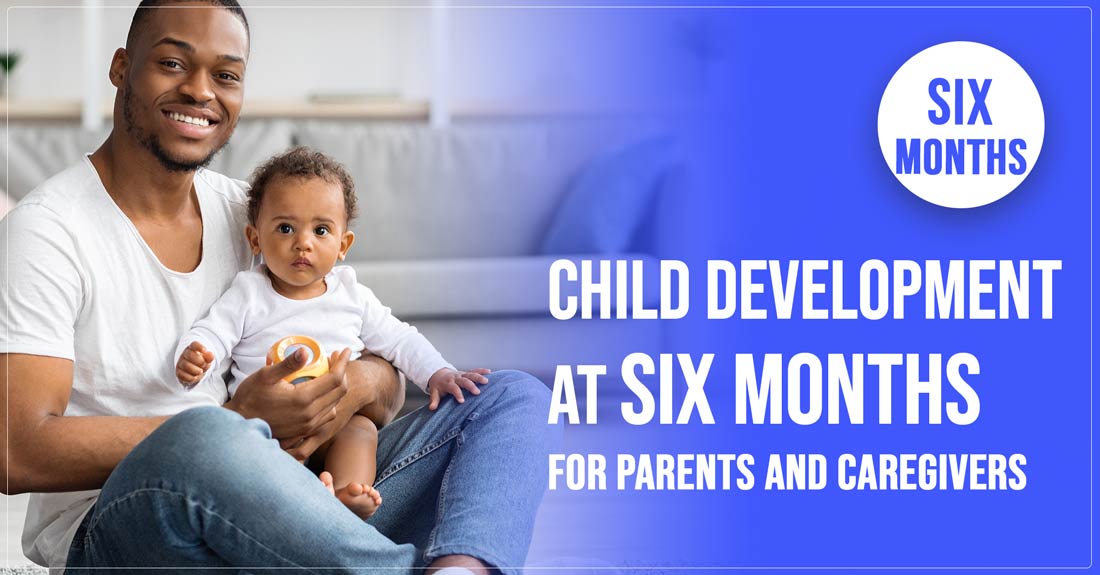Milestones & your 6-month-old!
Somehow, the time has flown by, and your baby is now almost six months old! This milestone is one of the greatest because your child is halfway through infancy. Your baby has shown incredible growth in just six months and is so much closer to being a fully capable person.
6-MONTH OLD MILESTONES | FREE DOWNLOAD
Child Development-6 Month Old – Baby’s Growth
Most six-month-olds are twice their birth weight! In fact, the average baby weighs between 16 pounds and 17 pounds at this stage! Now that your infant is 6 months old, it’s very likely that your baby will grow at around 1 to 1.5 pounds a month. It is also not unusual for your baby to grow about 1/2 to 3/4 of an inch before they turn seven months old. So even though your baby has grown quickly, their growth will likely slow down after the half birthday.
Developmental Milestones –
Cognitive Development & Physical Development
A baby’s development is significant at 6 months because they can now think, learn, and attempt problem-solving. Their cognitive developmental milestones are what lead to the creation of their personalities. A 6-month-old baby’s mouth shows curiosity and explores items by putting them in his mouth. Part of the child’s development is also playing games and having fun. Daily activities for most babies include playing with toys such as rattles or a soft ball. Playing interactive games like peekaboo or patty cake can also help the child progress towards cognitive milestones.
One significant change in baby development is when their teeth start to grow in! A very young infant starts teething at different times, but most children begin between six and twelve months after birth. The first teeth to come in are usually the front bottom two teeth.
Teething can be a painful process for babies. They often have swollen gums, which can cause the baby to be fussy or cry. To help ease the pain, you can give them something cold. Cold items can include a cold pacifier, a solid teething ring, or a spoon. You can also provide them with a toy to try and distract them, so they don’t notice the discomfort. Consider using pain medication like acetaminophen if they are distraught. Review your child’s symptoms with your healthcare provider if you have concerns.
Introduce Foods
It is best to introduce different food to your baby when they are between 4 and 6 months old to get the nutrients they need while fostering oral motor development. Once your baby has tried solids, it is likely that they will quickly begin to show dietary preferences. Continue to offer a variety of foods and textures. Signs that your baby may be ready to eat solid foods include:
- having good head and neck control
- developing a raking grasp when they grab with all fingers, or a pincher grasp with the thumb and forefinger to grasp objects
- showing interest in solids
- sitting up without significant support from family members
- opening mouth for a spoon
Ingesting solids is essential for babies’ health, so make sure to feed your baby small, soft meals of fruits, vegetables, grains and proteins. Then, they can start eating the same meal as you!
Emotional Milestones
At 6 months, a young child will develop skills to analyze emotions and tones of voice. Your baby’s progress is quite an emotional feat since they can start showing their personalities. They will start to exhibit mood swings, read other people’s emotions, make eye contact with people, and develop strong emotional attachments to their parents.
Babies can also form deeper emotions for familiar faces and are shy towards strangers. According to peer-reviewed studies, babies can even distinguish between adults and children. T y will even smile at other children and make vowel sounds and consonant sounds as if they were communicating. You will see your infant making sounds at you and others. This is the beginning of speech!
Language Skills
Another developmental milestone for children is to learn language skills. Six-month-olds are at the age where they enjoy the sound of their voice, and they are more verbal. They also make more varied sounds and squeal to express their different, more developed emotions. Sounds include both vowel and consonance sounds. In addition, these infants may start to recognize certain words such as their names, yes, no, mom, and dad.
Motor Skills and Mobility
Six-month-olds have better mobility, and many can crawl, rock back and forth on their hands and knees, and rest on their elbows. They are even able to sit upright in a highchair. In addition, they can be taught to drink out of a sippy cup at this age. Although it may take a while for the baby to use the cup, it will help make mealtime slightly easier for parents in the future. Infants can usually sit without support or with minimal support and may be at the brink of walking, and they can bear weight when standing. They even look like they want to jump and repeatedly bend their knees while standing. Play with your infant by having them sit and help them stand and sit back down again. This exercise will help strengthen their legs, arms, and core. Show them how to roll from back to front and front to back.
FAQs – Frequently Asked Questions
Should You Put Your Baby In Day Care?
There are varying opinions of whether it is good to allow others to care for your baby as early as 6 months. Some parents think it is better for a baby to stay with their child for foster childhood attachment. However, other parents must return to work, and child care is required or desired. Child care can help your baby form communication skills and experience a different environment. The baby can also benefit from exploring the world outside the home. Whether the baby stays with you for 6 months or longer or is out in the world sooner, know that they will develop well and be loved and cared for.
How Much Does a 6 Month Old Baby Sleep?
A 6-month-old baby should sleep between 12-16 hours a day. At this stage, most of those hours are at night, with three naps during the day. Babies at this age start to sleep through the night more regularly, and they don’t need to wake up to feed as often as those under 6 months old. They could easily sleep an entire 9 hour night, and sometimes even more. It is best for their health to get enough sleep.
How Do You Know What Food Your Baby Is Allergic to?
When feeding your baby new food, it is best to keep a close eye on your baby if they have any allergies. Food allergy symptoms will appear relatively quickly, so look for hives, rashes, vomiting, coughing or flushed skin. Be especially careful when introducing commonly allergenic foods like cow’s milk, peanut butter, egg and soy. We can support their health by introducing only one new food at a time to best identify what the trigger is if there is any allergic reaction.
Is it dangerous to hold them in a standing position?
Many kids this age like to stand and jump. It is not dangerous to hold them this way while supporting their weight if they want to jump or stand. Many children this age like standing in exersaucers to play.

Dina is a wife, mother of 4, and adrenaline junky. She loves to share children’s health information from her professional and personal experience. More About Dr Dina.















